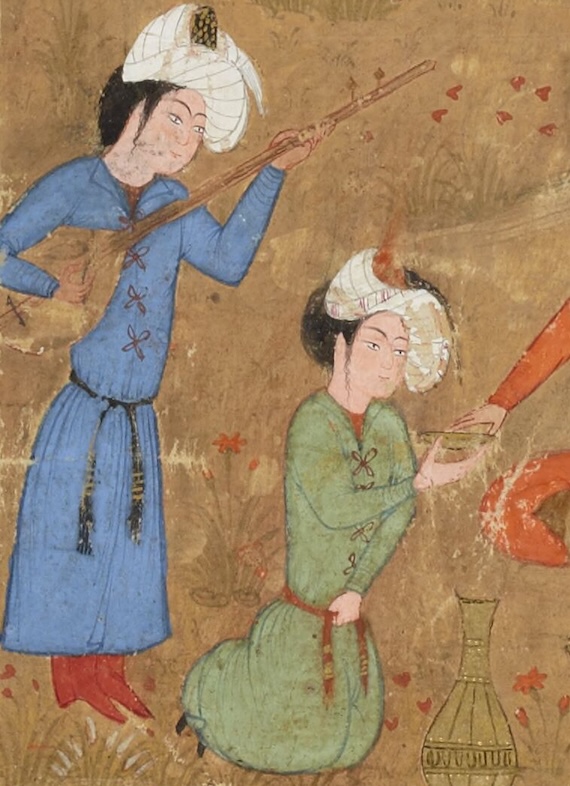Stanza no. 20 in in the first edition of Edward FitzGerald’s The Rubáiyát of Omar Khayyám celebrates wine as a means of escaping lingering shame and the dread of an unknown future. It is about, as the hippies used to say in the 1960s, “being here now,” with a little help from a mind-altering substance. You can see why the Rubáiyát was still wildly popular in the Sixties in the youth culture. The first Grateful Dead album cover was a woodcut illustrating the Rubáiyát. There is no point, the poem says, in setting your hopes on tomorrow, when you may be joining eternity.
xx.
Ah, my Belovéd, fill the Cup that clears
To-day of past Regrets and future Fears —
To-morrow? Why, To-morrow I may be
Myself with Yesterday’s Sev’n Thousand Years.
A. J. Arberry identified the original Persian as no. 363 in the Calcutta manuscript, a version of which can be found at this site.. The Calcutta version differs just slightly:
ای دوست بیا تا غمِ فردا نخوریم
وین یک دمِ نقد را غنیمت شمریم
فردا که ازین روی زمین درگذریم
با هفت هزار سالگان سربه سریم
Here’s a literal translation in blank verse:
Let us not wallow in tomorrow’s grief
but count today’s coin as a vast fortune.
Tomorrow — gone from the face of the earth —
we’ll join the seven-thousand-year-old gang.
—-
Order Juan Cole’s contemporary poetic translation of the Rubáiyát from
or Barnes and Noble.
or for $16 at Amazon Kindle
——-
Ironically, although the Persian originals mention wine quite a lot, this one doesn’t, at least not explicitly, so FitzGerald added it in.
I think the point of being “head to head” with the “seven-thousand-year-olds” is that we’ll be in the grave with people who’ve been dead a long time. This poetry doesn’t believe in an afterlife, so when people are dead, they are dead, and they’ll stay that way as long as the universe exists. I suspect this poem was composed by a medieval Indian, since Indian philosophy plays around with large numbers. Omar Khayyam the medieval mathematician and astronomer serves as a “frame author” for this genre of skeptical and libertine poetry produced by many hands over the centuries, the way Scheherazade does for the Arabian Nights tales produced over hundreds of years in Baghdad, Cairo and Aleppo.
The Sufi poet and ethicist Saadi of Shiraz (d. 1291/2) rebuked the materialists who questioned the spiritual world.
ای که انکار کنی عالم درویشان را
تو ندانی که چه سودا و سر است ایشان را
You, who deny the world of the mystics
you do not know what passion or secrets they possess.

“Muzafarrid musician and wine attendant, Shiraz, circa 1390. From an MS of Kalilah wa Dimnah, Bibliothèque Nationale de France. Public Domain. Via Wikimedia Commons
The denial of the resurrection and the afterlife was probably the most challenging message of this poetry in the mid-Victorian age when FitzGerald first translated it, and he was clearly a little afraid of being denounced by the Church — as had happened to publisher Edward Moxon, who brought out a posthumous edition in 1839 of Percy Bysshe Shelley’s Queen Mab, which was accused of being blasphemous. Moxon was convicted, but the prosecution sought no punishment.
Denying those religious verities would also get a person in trouble with some Muslim monarchs, though not all. The Bodleian manuscript of the Rubáiyát was produced at the rebel court of Shiraz of Pir Budaq, a Turkoman QaraQoyunlu prince who was lambasted as a hard-partying atheist by contemporary chroniclers. The problem for a poet who wrote racy or skeptical verses is that you never knew when a new king’s troops would sweep into your town, and the new guy might be pious and censorious. So if you wanted to write this kind of poetry, better to say you found it in an old manuscript of . . . Omar Khayyam.
—-
For more commentaries on FitzGerald’s translations of the Rubáiyát, see
FitzGerald’s Rubáiyát of Omar Khayyám: Commentary by Juan Cole with Original Persian

 © 2026 All Rights Reserved
© 2026 All Rights Reserved